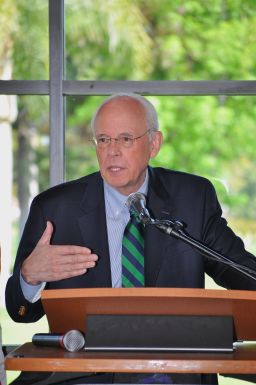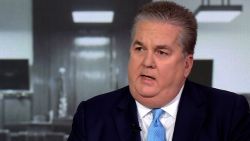Editor’s Note: John W. Dean is a CNN contributor and former White House counsel to Richard Nixon. Follow him on Twitter @johnwdean. The views expressed in this commentary are solely his. View more opinion at CNN.
Let me tell you how it used to be for a White House whistleblower.
In 1973, a few weeks before my testimony to the Senate Watergate Committee, the chairman, Sam Ervin of North Carolina, became concerned for my safety. There had been a steady stream of death threats against me that he felt could not be ignored. The committee had thought the Capitol Police could protect me during the hearings, but Ervin did not think that was enough.

He talked with the newly appointed Watergate special prosecutor, Archibald Cox, about the situation. There was a relatively new program, authorized in 1970, to protect federal witnesses. It was run by the US Marshals Service, an agency of the Justice Department, which reported to President Richard Nixon. Ervin and the attorney general, Elliot Richardson, were confident that even though I would be a witness against the President, the marshals would protect both my safety and privacy.
My wife and I agreed. I was under the protection of two marshals, sometimes 24/7, for the next 18 months. Those marshals were consummate professionals, and I am sure their successors are, too. The Marshals Service is an organization that takes great pride in its quiet but effective work.
Now we have a different president and a different whistleblower. President Trump says he wants to find out who it is – the person who filed a seven-page complaint in August accusing the President of “using the power of his office to solicit interference from a foreign country in the 2020 U.S. election.” But thanks to the Whistleblower Protection Act, Trump has no legal right to know this person’s name.
Attorney General William Barr, who was named in the telephone call by President Trump as well as in the whistleblower complaint, has refused to recuse himself from this matter. So his shadow hangs large over the Department of Justice’s dealing with the whistleblower.
The Inspector General of the Intelligence Community, Michael Atkinson, investigated the complaint and found it “credible” and also of “urgent concern” – a term employed by the Whistleblower Protection Act to designate a “serious or flagrant problem, abuse, [or] violation of law or Executive Order….” When the Acting Director of National Intelligence requested advice from Barr’s Justice Department on Atkinson’s conclusion, the department disagreed. It decided that the WPA did not apply and that the case should not be criminally investigated.
This is deeply troubling, given that Barr is so prominent in these documents, and that the Justice Department’s reasoning so severely strains credulity.
On their face, the actions reported by the whistleblower and the rough transcript of Trump’s conversation with Ukrainian President Volodymyr Zelensky look like bribery and extortion and campaign law violations. Trump, who was withholding some $400 million in military aid to Ukraine at the time of his call, asked Zelensky for a “favor” – help in investigating a discredited right-wing conspiracy theory that Ukraine, not Russia, was behind the hacking of the Democratic National Committee’s email servers.
Trump also wanted Zelensky to investigate whether former Vice President Joe Biden influenced a Ukrainian prosecutor’s investigation of a company for which Biden’s son Hunter worked. There is no evidence of wrongdoing by either Joe or Hunter Biden.
Indeed, all these matters have been previously investigated with none producing results to Trump’s liking, so it appears Trump wanted Ukraine to create bogus information. As the whistleblower reported, the Zelensky call was clear evidence of Trump using the power of his office for personal gain. (Trump has denied any wrongdoing.)
The chairman of the House Intelligence Committee, Adam Schiff, compared it to a mafia “shakedown.” The Justice Department’s see-no-evil stance is untenable. It appears that William Barr is deeply involved in trying to discredit the work of the American intelligence community – an extraordinary and unprecedented betrayal. (Justice Department spokeswoman Kerri Kupec said in a statement that the President “has not spoken with the Attorney General about having Ukraine investigate anything relating to former Vice President Biden or his son.”)
Given the circumstances, it is understandable that the attorneys representing the whistleblower are concerned about the safety of their client, and wrote a letter to the Acting DNI seeking assistance. To my knowledge there is only one federal entity capable of providing safety to witnesses: the US Marshals’ Witness Security Program. However, this program is run by the Department of Justice, and it is not likely Barr would provide protection to a witness he does not believe is, in fact, a whistleblower, but rather someone President Trump is already seeking revenge against.
Chairman Schiff has publicly expressed concern for witnesses involved in his inquiry, given Trump’s implicit threat that whistleblowers should be executed. Schiff should go to Deputy Attorney General Jeff Rosen, who does not appear to have a conflict, to seek US Marshals protection for the whistleblower, and any other witnesses who might be threatened.
Get our free weekly newsletter
David Gergen was correct in telling CNN that if anything happens to the whistleblower, it will be Trump’s fault. So, the Justice Department should not alert the President, who has abused his power and is likely to do so again.
No press releases should be issued. Instead, this should be done simply and quietly. It is difficult to imagine a more important federal witness than one who testifies in an impeachment proceeding. That witness needs to be protected.






















